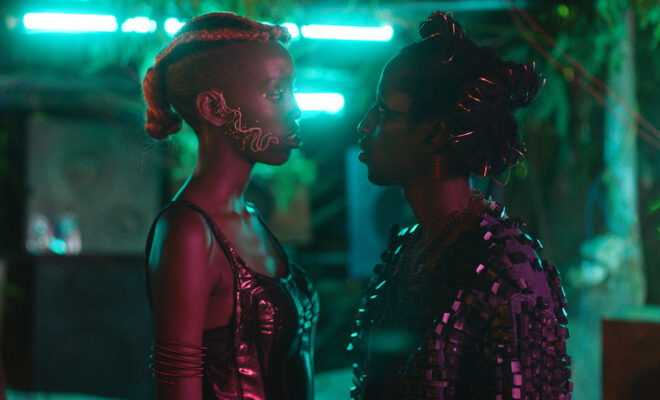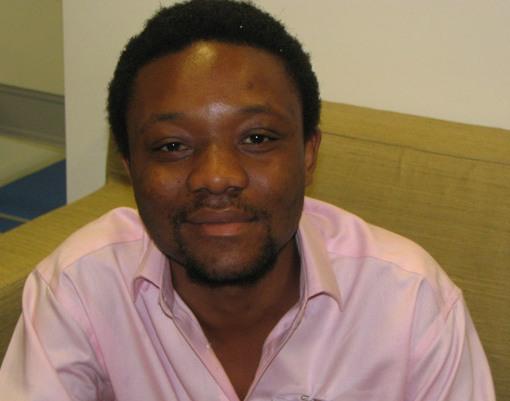The best African films of 2022

In an uncertain year for the industry, African cinema continued to thrive as filmmakers found industrious ways to create despite myriad roadblocks. Many of the films on this list are inward reflections of their creators, ranging from political thought to migration, health services to legacies. The ten films below are a snapshot of some of the finest stories told across African cultures.
Among Us Women (Ethiopia/Germany)
It isn’t commonplace that a film chronicling characters like the rural women centred in Among Us Women trusts the subjects to be and creates the environment that lets them speak openly about their realities. Taking its title seriously, Among Us Women, directed by the duo of Sarah Noa Bozenhardt and Daniel Abate Tilahun, sensitively observes a cohort of rural Ethiopian women as they debate enrolling in the obstetric services offered by the staff of a local health centre.
The Blue Caftan (Morocco/France/Belgium/Denmark)
Maryam Touzani’s sophomore feature is a considered reinterpretation of love and family, presented with tenderness. When a closeted queer tailor, Halim (Saleh Bakri), and his loving wife, Mina (Lubna Azabal), are joined in their modest shop by a hot new apprentice, Youssef (Ayoub Missioui), the couple must learn to renegotiate the parameters of their union. The Blue Caftan establishes the obstacles that prevent queer people from living openly but dares to suggest a hopeful outcome for its protagonists.
Father’s Day (Rwanda)
In Kivu Ruhorahoza’s affecting triptych on contemporary parenting, a struggling masseuse is haunted by the accidental death of her son, a daughter contemplates donating an organ to save her ailing father, and a feckless small-time criminal introduces his young son into his murky world. The three seemingly unrelated stories, all set in and around Kigali interrogate the traumatic effects of traditional patriarchal systems.
Girl, Taken (South Africa/Ireland)
Girl, Taken is the incredible non-fiction chronicle of one of South Africa’s most fascinating crime stories. In 1997, two-day-old Baby Zephany disappeared from her cot in a Cape Town hospital. Investigations led to a dead end despite the case being a source of media obsession. 17 years later and teen Zephany finds out she was raised by an abductive mother after she befriends a student at school who just happened to be her biological younger sister. Directors François Verster and Simon Wood dig through the archives to emerge with this empathetic account of a deeply disturbing saga.
Lingui, the Sacred Bonds (Chad/France/Germany/Belgium)
Mahamat-Saleh Haroun returns to his native Chad with this timely yet instantly timeless socio-realist drama that tackles abortion rights in a conservative society. Amina (Achouackh Abakar Souleymane) is an independent woman who finds herself in a race against the forces of patriarchy when her teenage daughter Maria (Rihane Khalil Alio) gets pregnant. Amina supports her daughter as they try to get an abortion, a procedure that is both frowned upon by Islam and illegal in Chad.
Neptune Frost (Rwanda/US)
From the imaginative minds of creators Saul Williams and Anisia Uzeyman comes this radical vision of a digital, dystopian future. Neptune Frost doesn’t pander to audiences but demands attention nonetheless. Neptune (Cheryl Isheja), an intersex hacker, is guided by magnetic pull to Digitaria, an enclave in the hills of Burundi peopled by rebel hackers. They are joined by Matalusa (Bertrand Ninteretse), a miner mourning the loss of his brother. Both outcasts sing, dance, trade ideas, and fend off interference from operatives of the state while envisioning a whole new future for themselves.
No Simple Way Home (South Africa/Kenya/South Sudan)
Akuol de Mabior turns the gaze inwards and considers the legacy of her family in her native South Sudan. Resident in Kenya, de Mabior, daughter of the late liberation hero John Garang attempts a return home when her mother, Rebecca, is called to serve as one of South Sudan’s vice-presidents. She soon finds that going home is not as easy as envisaged. Perceptive, personal, and acutely political, No Simple Way Home offers insights into a family legacy intimately tied to the history of a young nation.
Public Toilet Africa/Amansa Tiafi (Ghana)
For his first feature, director Kofi Ofosu-Yeboah takes a unique and stylistic approach to cinema, combing out several narrative strands and connecting them to critiques of post-colonialism. The primary plot is driven by Ama (Briggitte Appiah), a mysterious young woman with a license to kill. Paying homage to the work of Djibril Diop Mambéty, Public Toilet Africa is a an outrageous and often clumsy ride down the Ghanaian coast that ultimately rewards viewers willing to give it a chance.
Under the Fig Trees (Tunisia/Switzerland/Qatar/France/Germany)
In this surprisingly radiant feature-length debut by French-Tunisian filmmaker Erige Sehiri, a group of fig harvesters doing gig work in an orchard where the management seeks to exploit them makes for captivating viewing. Sehiri’s ever-present camera trails the mostly non-professional cast of actors documentary-style as they go about doing or avoiding work, fighting and looking out for one another. The film celebrates labour solidary and the richness of community but manages to embed critiques of an exploitative capitalistic system.
When a Farm Goes Aflame (Germany)
With his latest feature, Jide Tom Akinleminu unspools a riveting and frustrating look at a family legacy of secrets, lies, betrayal, and even more secrets. A deeply personal documentary that seeks answers about identity but raises more questions, When a Farm Goes Aflame uses archival footage, close up portraits, and home video recordings to assemble a compelling account of how actions and indiscretions can set off ripples that leap across time, crossing cultures and generations.





